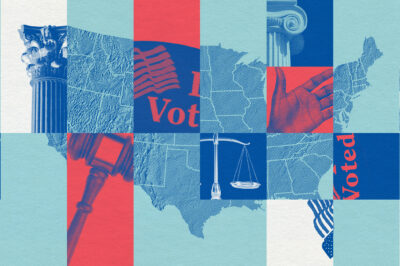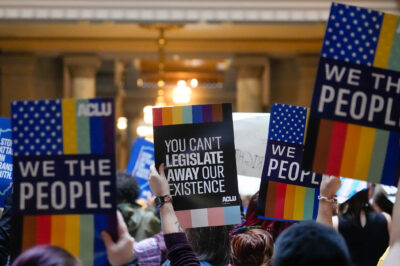
The ACLU is challenging a discriminatory single-sex education program in which state?
Which social networking site reversed its rejection of ads on marijuana legalization after the ACLU of Northern California and Electronic Frontier Foundation raised concerns for free speech?
By what percent has the average length of prison sentences in the U.S. increased since 1990?
At which Boston airport have TSA officers reported that TSA management’s “behavioral detection program” leads to racial profiling?
Do you live in a city where TrapWire surveillance is in place?
What Happens When You Teach Stereotypes Instead of Kids?
At Van Devender Middle School (or Vandy), a public school in Wood County, West Virginia, the boys’ classroom is brightly lit and cool, and the students are allowed to run around to blow off steam. They can sit in beanbag chairs if they wish and their desks are moveable and do not face each other. The girls’ classrooms are warm and dimly lit, and students are expected to remain in their seats and face each other while they work, even if they find that distracting. Girls are expected to discuss their feelings about novels while boys are expected to discuss the action in the books.
This week the ACLU filed a lawsuit challenging this discriminatory program.
Political Speech on Facebook: Like This
In a victory for free speech on the Internet, social network giant Facebook last week corrected a mistake that had the unfortunate consequence of blocking political speech and affirmed its commitment to serving as a neutral platform for political advocacy. The controversy erupted when the social network, which positions itself as a key platform for reaching “a huge potential voter pool,” rejected ads by Just Say Now and Students for Sensible Drug Policy, drug policy reform groups which both seek to promote discussion of marijuana legalization in the current election cycle. Fortunately, after the ACLU of Northern California and the Electronic Frontier Foundation raised concerns, Facebook reversed its rejection and permitted the ads to run.
Extreme Sentencing
For the crime of stealing a purse, Willie James Sauls was sentenced to 45 years in prison. The prosecutors in the case justified the long sentence by pointing out that Sauls has prior convictions and that he “already had chances to address the issues with his behavior.” Then there is Larry Dayries, who stole a tuna sandwich from Whole Foods while wielding a knife. He had prior convictions for burglary and theft, so the sandwich incident landed him a 70-year sentence. Since 1990, the average length of prison sentences in the U.S. has increased by 36 percent. Long sentences for non-violent first offenses, coupled with laws mandating increased penalties for repeat offenders, mean our prisons are more crowded than ever – even as crime rates have fallen.
Racial Profiling at Logan Airport Undermines Security and Freedom
Reports that the so-called “behavioral detection program” at Logan Airport leads to racial profiling is front-page news in last Sunday’s New York Times. You have to admire the courage of the TSA screeners who raised the alarm that pressure from TSA management to meet quotas leads to targeting of passengers based on their race, ethnicity, and religion– even when they clearly pose no terrorist threat.
What to Make of the TrapWire Story
Some of the Wikileaks-fueled swirl of stories about the TrapWire program appear to have been overhyped, as my colleague Kade Crockford of the ACLU of Massachusetts noted in her excellent roundup of the story yesterday. Others writing about the program have followed suit.
But let’s not overcompensate for the hype and get too world-weary and cynical here; while many questions remain about this program, it does raise some very significant issues. And it deserves a high level of attention and concern.
This is your week in civil liberties. Let us know if this is useful or if you’d like to see changes. Share your thoughts: ideas@aclu.org
Learn more about your rights: Sign up for breaking news alerts, follow us on Twitter, and like us on Facebook.



